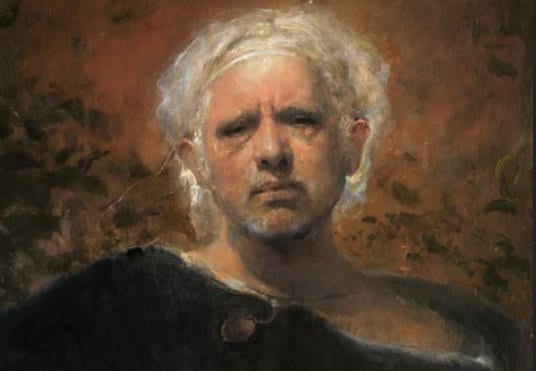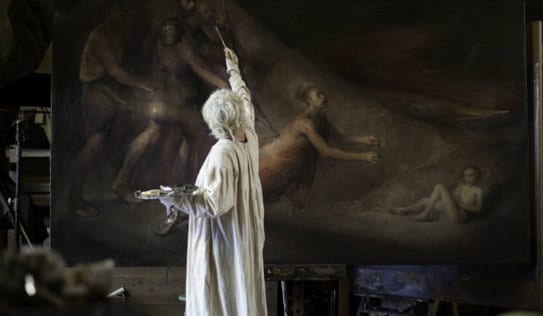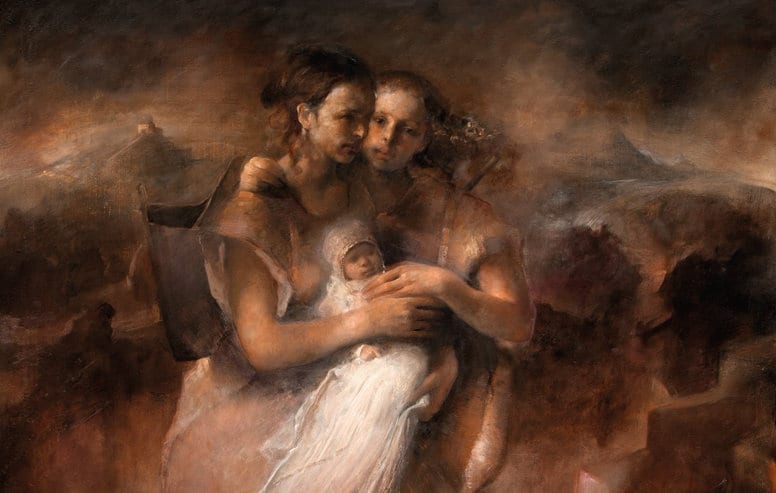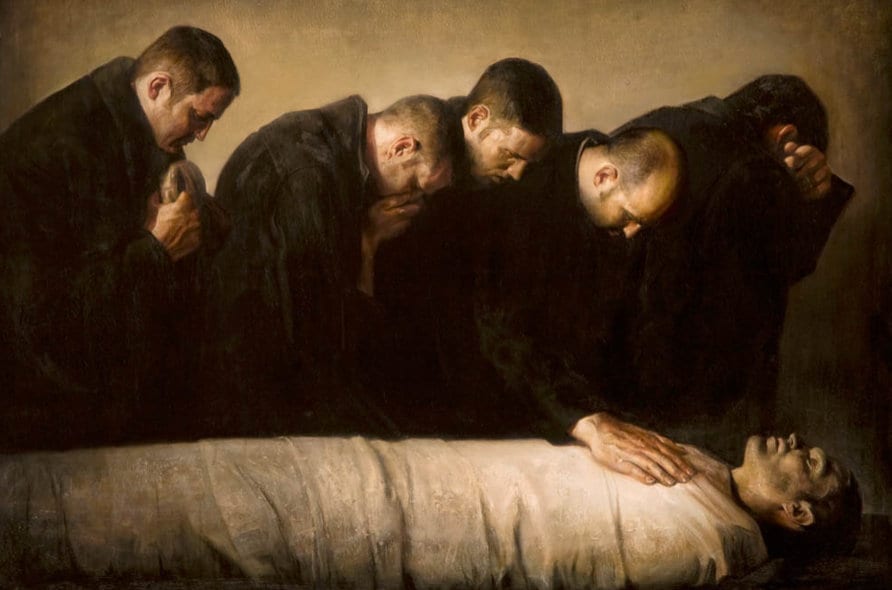Herland Report: Art is the language of the Gods. Painted with fluid words from another dimension, art ruptures the limitations of language, opposes stagnation and indifference, pleads for change and challenges men to consider the journey through life with a new awareness and a lively gaze, writes historian of comparative religions, author and founder of The Herland Report, Hanne Nabintu Herland.
The text is to be found as the foreword to Odd Nerdrum’s book “Crime and Refuge”.
Odd Nerdrum masters this craft to such excellence that many call him the greatest painter since Edvard Munch. And we agree, as stated in Crime and Refuge.

Several thousand years old and filled with harsh, poignant and beautiful stories of human history, the Old Testament is one of the world´s oldest texts.
In the Books of Moses, God is described as the source of the artistic spirit. God alone determines the recipient of this wonderful gift. Michelangelo’s “Creation” captures the dramatic incident when God in a cosmic inferno moves down to touch Adam, who is given life. This moment of self-definition marks the origin of Adam´s true existence.
 Here hope is awakened that goodness will triumph over evil, imperishability will triumph over the fallen nature of man.
Here hope is awakened that goodness will triumph over evil, imperishability will triumph over the fallen nature of man.
Some few artists in history carry this breath of God, which ultimately leads to their immortality.
Prophets in times of change, when the selections of cultural directions were critical, they cried as Jeremiah did about judgment and destruction, hope and future.
We speak of these artists still, centuries after their passing: Rembrandt and his dramatic earth-hued scenes that impart life to dead canvas, the lush sensuality of Rubens, Raphael’s harmonious studies of depth, Caravaggio’s realism and burning light that shines from another dimension.
They captured Europe’s glorious days on canvas – the spiritual and vibrant explosion of new understandings, knowledge and science that permitted the innovations of Western Civilization to take root. Figurative art brought inspiring innovation, development and deep reflection.

In these grand works of art, time stands still. They provide an opportunity to mirror ourselves in the expressions of the life of others. We sense the possibility of an inner illumination, for integrity as a choice.
Here there is life as well as death. The consuming journey of life is described, that which begins the day we are born and that slowly guides us towards death.
RELATED ARTICLES:
- Odd Nerdrum: The Greatest Painter since Edvard Munch.
- Stefan Boulter on Cave of Apelles: – Stop fearing Cancel Culture, we are already Cancelled.
- Cave of Apelles: Adara Ryum on Biblical references in Henrik Ibsen plays / Nerdrum School
- Cave of Apelles: Ayn Rand’s Aesthetic Antidote to Kant, we need personal responsibility, Nerdrum School
With the gravitational force of reality as a lifelong challenge we are trapped in the brutal struggle between life and ruin.
Often people cannot tolerate the consequences of their own choices. We die from the poison of the mind.
The transcendental language of figurative art, that proved most potent under the great masters, challenges the individual. What do we choose when life rots, when the seas roar and there is no respite anywhere? Do we opt for, in our worst moments, self-discipline, responsibility and respect for our fellow men or do we allow the thunder of time to crush the quest for life?
Odd Nerdrum bears such a breath of God. He is one of our time’s greatest painters, maybe the greatest, a dissident individualist who deconstructed elements of the emptiness of modernism.
He rowed against the tide and insisted upon lifting up the European cultural traditions in an age which is about to forget its own civilization’s greatness.
Nerdrum’s ability to desert present trends of value-relativism, dissolution of traditions and incivility, made him draw lines past cheap originality. This makes him a genius who provides a refreshing reminder of what art really is.
Art is often first to mark cultural decline. Already several hundred years before the Roman Empire disintegrated artists lost knowledge of the methods of the Greek masters. The power to innovate disappeared as their wine goblets filled.
Generals no longer proudly sent their own sons to war, but hired foreigners to do the job. Artists began to copy and falsify and cheap imitations became popular. Whichever clothes the emperor wore, the people cheered. They wanted bread and circus, these who were on their way to cultural destruction.
Also our own time is characterized by dramatic changes accompanied by rampant, unbridled faith in modernization, technological innovations, secularism, abandonment of traditional European values and an inherent and overly positive belief in human abilities.
Nietzsche proclaimed early that existence was meaningless, God was dead, conscience a burden and that the time had arrived for man to rule without inspiration from any other than himself.
Already in 1910 the sociologist Emile Durkheim noted in Suicide that rapid social changes associated with modernism led to significant confusion in the values of an individual, especially in Protestant countries where the revolt against traditional family patterns and other stabilizing cultural pillars was particularly strong.
An increasingly lonely life as a result of disintegration of old traditions of knowledge, workplace changes and job mobility, growth of large cities and loneliness, alienation from nature and all things natural, all contributed to a disturbing lack of meaning. Where truth and integrity disappear, the human tendency to selfishness becomes the god of the times.

A glittering civilization can disappear. It can decline and fall. History abounds with examples of cultures where willingness to work, discipline, a strong defence and common values were the initial characteristics.
A golden age of growth and prosperity then followed. But before the culture lost its greatness and slid into the past with lost luster, the citizens passed through a phase where, confused, they labeled traditional ideals and knowledge as old-fashioned. The common belief was that art was outdated, that time has left the spiritually-awakened masters behind.
You lose some of the ability to be humble when facing the world, if there is no thankfulness to anyone but yourself. Those who lived before, with all their wisdom and wit, become useless unwanted extras.
The elite become self-sufficient and proud, sleep ensues. Family cohesion and empathy wither. Too many slumber through life and exist only as empty shells and dead minds.
Those that are different are excluded. All are convinced that human rights come without obligation. They misunderstand what individual liberty really is, as self-realization and selfishness dominates at the expense of cohesion and solidarity.
Knowledge about what is really important meets opposition in our time, while culture moves in new directions. The fluid identities of modernism, so well described by Zygmunt Bauman in Liquid Modernity, rip up cultural roots and ridicule stability. They instituted prolific reforms, and failed to remember that not all reform is for the better.
Many traditional ideals are worth preserving. World War II showed just that, in the midst of modernism’s self-exalted innovations and haughty spirit, the face of evil materialized.
Today an underlying sadness weighs heavily on the materialistic Western Culture.
Stark silence accompanies any discussion of the spiritual dimension in a time where we seldom seek deep thoughts. Civilization is blanketed with a light fog of melancholy neuroses, mental illness and addiction to chemical stimuli.
Sexual liberation and, as Nietzsche suggest, abandoning the duties of conscience provide no answers. The consequence of culture´s over-idealization of the material dimension is a hunger, an inner poverty and a lack of integrity in an era where moral issues are marginalized.
Collective denial of essential aspects of humanity stifles our culture and makes us poor. In times like these, the significance of Odd Nerdrums paintings become even greater. His work calls for a new focus on the greatness and importance of European history and its vital historical and traditional values.
Thus Caravaggio’s “Narcissus” becomes relevant, the portrayal of Greek mythology of the beautiful son of the water god, who cannot distinguish between good and evil, sleep and awareness, self-discipline and self-destruction and ultimately drowns in his own reflection.
He stares at himself in the pond, absorbed by his own beauty and unable to love anyone but himself. When you are on a carousel spinning uncritically towards Narcissus, humility fades in the face of the world´s grandeur. Culture approaches moral anarchy, the state that precedes the downfall of a civilization.
Denial of the greatness of European traditions is a hallmark of our time. Those who do not bow to the spirit of the times, often have had to flee their homes.
This also characterizes Odd Nerdrum. He comes from Norway, one of the world’s smallest countries, so icy and cold in the far north of Europe, steeped in bourgeois peer pressure, socialism, an inherent fear of others, envy and gossip. The ceiling is remarkably low in this culture of envy.
There is little room for cultural expressions that shake the worldview of today’s self-absorbed cultural elites. Ibsen and other significant artists left the country long before Nerdrum.
Today practically no stone has been left unturned in the effort to punish Nerdrum’s artistic talent as he abandoned aspects of the politically-correct modernism and rebelled against emptiness.
The paintings of Nerdrum, this great son of Norway, should have decorated the chambers of the Queen, the offices of the prime minister, the walls of ambassadors and been widely represented in the National Gallery and in other official institutions. The Norwegian state should have taken much pride in buying and exhibiting his internationally renowned work.
There is something totalitarian about these modern democracies that fly beneath the high banners of freedom, but in reality contain powerful elites that exert ruthless pressure to achieve conformity, sameness and consensus. It’s like the line of African slaves forced to chant “freedom, freedom” while marching towards the ships bound for America.
Aldous Huxley described it well in Brave New World. He showed just how totalitarian modern society can become when individualism, personal responsibility in the community, self-reflection, wisdom and the right to be different disappears.

A significant thrust towards institutionalization follows, a de-personification, an emotionless collective tyranny of consensus in a welfare state that singularly emphasizes materialistic rights and demands.
In the end there remains only strict uniformity in a bureaucratic state that determines and dictates everything. Those who think for themselves have become the undesirable who are interned in separate camps. They are criminalized, removed and killed.Odd Nerdrum has endured this petty Norwegian tyranny.
But it will only make his art even greater. For posterity will ultimately judge us when the fog of our own time has settled and all the participants lie cold in their graves. Then there will be silence. Envy will cease. We become voiceless.
The moment of death deprives us of the ability of any more treachery. The evil once so active, sleeps now in anticipation of the inevitable apocalyptic Day of Judgment.
The nerve of life, this temporary gift, this ability to breathe for a few short years and choose between good and evil, is cut and leaves us as dead corpses. Warm skin turns cold. Into this realm, not even the muses of Greek mythology are able to cheer, these creatures that seek to find a way back to freedom, the forgotten knowledge, true art.
The Old Testament describes human life as a stalk of grass that grows in the morning and is thrown into the fire at night. We are no more. The only thing that survives death is the breath of God.
This immortal heartbeat carries further, into dimensions that man previously met only in architecture, art, and Gothic churches, the Baroque, ancient sacred writings, in myths and while our bodies slept, in the vague world of our dreams. We have touched a fragment of these dimensions in exalting moments of joy and seen it in Michelangelo’s portrayal of God touching Adam’s finger.
Here in the arms of death, only the great masters remain great. All the rest of us disappear off the cliff and over the void like swarms of buzzing locusts.










